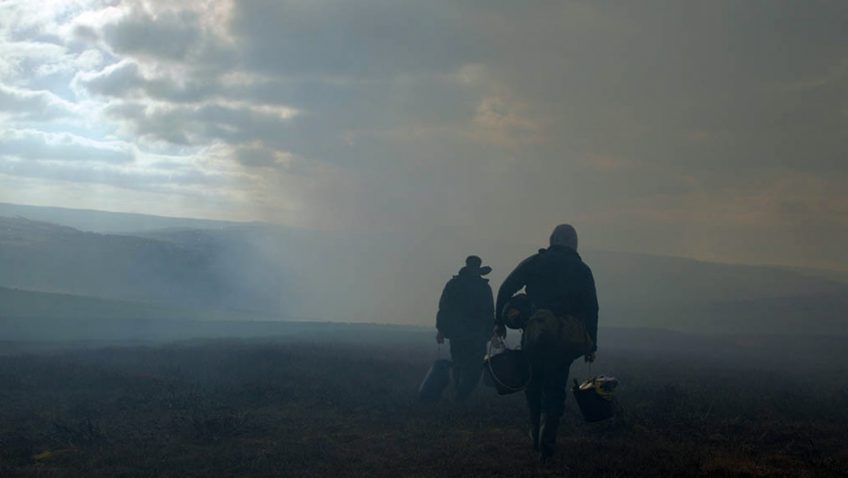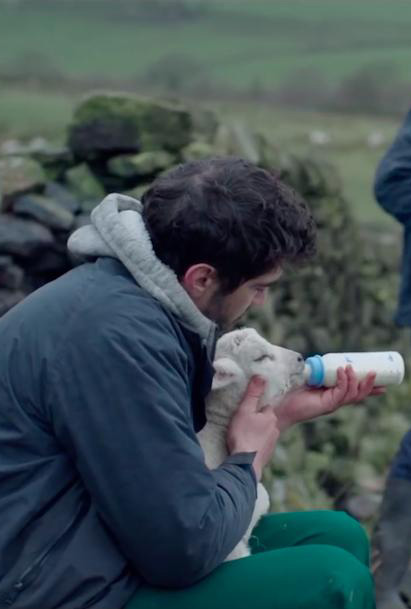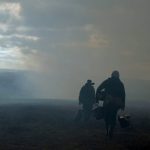Joyce Glasser reviews God’s Own Country (September 1, 2017) Cert 15, 104 min.
The title might refer to Yorkshire’s beautiful countryside that two farmhands admire on an overnight during lambing season, but it is a loaded one. First because God’s Own Country becomes the site of a passionate homosexual encounter and second because one of the farmhands is a Romanian migrant worker for whom country is not a bordered nation. Francis Lee’s debut film boasts an impressive performance from Alec Secareanu as the hard-working Romanian immigrant, but Lee’s attempts to differentiate his film from that of his namesake, Ang Lee are transparent. While there is much to admire in Lee’s moody British chamber piece, at its core, it is a more visceral and explicit English version of Brokeback Mountain, without the epic feel, the romance and the visual poetry that made that film a masterpiece.
Johnny (Josh O’Connor), 24 and single, lives and works on the family farm in the Yorkshire Moors, where his workload has just become heavier as his father (Ian Hart) is an invalid after an accident. No one mentions the mother, but her role – cooking, cleaning and looking after her men – is taken up by Johnny’s discretely observant granny Deidre (Gemma Jones).
Though the nearest city, Bradford, represents the bright city lights for Johnny, a tense encounter with a high school friend tells us all we need to know about his restricted social life. Johnny is so introverted that when he says anything, he communicates in short grunts. Most of his friends from school have gone beyond Bradford for work or to attend university. Johnny’s hostility to the college crowd masks low self-esteem and a wound that has not healed. We are, at first, not sure what that wound is, but soon discover his inability to deal with his sexuality.
That Lee, who is 47, grew up on a Yorkshire sheep farm is no surprise as everything he learned before decamping to London to become an actor is on display here. Just as Johnny associates the countryside with hard work, so Lee has stripped the Yorkshire Moors of any holiday home romance and creature comforts. The farmhouse and the farmyard have a lived in, authentic feel, neither too Spartan nor too comfy. Every shot is visceral, whether we are on the cold, exposed hills that begin to chill our bones or confronted with the mucus and blood oozing out of an ewe that has a just given birth. Lee is insistent that we witness the birthing process as veterinary students might and there are enough shots of men putting their arms up an ewe’s rectum to be considered symbolic foreshadowing.
At first Johnny resents the intrusion of the Romanian farmhand that his stern and crusty father has hired. From the beginning we are aware of the contrast between the handsome, manly, laid-back though polite and hard-working Gheorghe (Secareanu) and the off-putting, anxious, unstable Johnny, who approaches his work like it is an obligation that he resents. Gheorghe is a giver of life, which takes on a symbolic dimension later on. When a lamb is born seemingly dead, Gheorghe never gives up until he has pumped life into it and cradles it in his arms like a mother with a baby. And when a runt is born dead, Gheorghe skins it (audiences will wince) and covers an orphan lamb with the dead lamb’s fur so that the bereft mother will adopt it.
Gradually Johnny starts watching his rival with a touch of curiosity and admiration. As in Brokeback Mountain it is when the two must spend a couple of days in a remote mountain shelter that they indulge their pent-up desire for one another. It is a scene that is as explicitly carnal and as unromantic as the sheep birthing. What is lacking is any sense of what the men see in one another other than sex. They do not seem to have fun in one another’s company or even have meaningful conversations.
In order to avoid the clichés about the homophobic rural community there are hints that people might not only be aware of Johnny’s sexual preferences, but that they might be more tolerant than he imagines. There is not only Johnny’s school friend back from university, but Deidre, who realises what is going on between the two men when she cleans up Johnny’s room. Even Johnny’s father seems to have accepted the situation by the end of the film when his deteriorating condition forces Johnny to confront a dreaded truth or lose what he wants most.
Johnny is not, then, in denial, but some fear or outdated image of masculinity has forced him to remain in the closet, with booze being his only company. That it is an uninhibited European with maternal instincts, yet, secure in his sexuality, who offers Johnny the best of both worlds, so to speak, is, in itself a cliché, but it is an interesting point with Brexit negotiators recognising the need for immigrant labour. Johnny’s need is anything but political, but his painfully restricted horizons grow in Gheorghe’s presence and he changes as a person, and as a man.
Lee shows a confident hand in these scenes, but there is something predictable and schematic about Johnny’s transition, and to underscore his character arc, Josh O’Connor makes Johnny a crude and unpleasant young man with whom it is difficult to feel much sympathy. The film feels unsubtle and heavy handed particularly when your mind wanders back to Brokeback Mountain.
You can watch the film trailer here:






